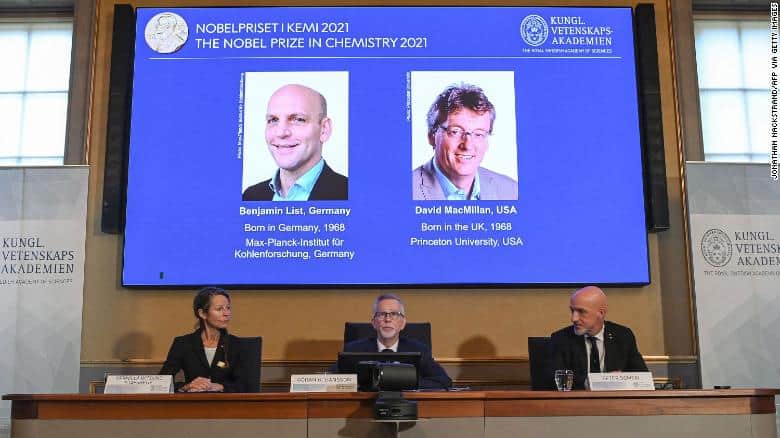The Nobel Prize in chemistry has been awarded to Benjamin List and David W.C. MacMillan, two scientists honoured for creating “an ingenious tool for building molecules” that has helped develop new drugs and make chemistry greener.
The pair were announced as the prize winners in Stockholm, Sweden, on Wednesday, for the development of asymmetric organocatalysis. Their discoveries “initiated a totally new way of thinking for how to put together chemical molecules,” said Pernilla Wittung-Stafshede, a member of the chemistry Nobel committee.
“This new toolbox is used widely today, for example in drug discovery, and in fine chemicals production and is already benefiting humankind greatly,” Wittung-Stafshede added.
List, a German scientist who is professor at and director of the Max Planck Institute for Coal Research, and Scotland-born chemist MacMillan, now a US-based professor at Princeton University, worked independently of each other but share the prize, the third Nobel award to be handed out this week.
In 2000, the two researchers uncovered a third kind of catalyst — a substance which brings about a chemical reaction — called asymmetric organocatalysis. Scientists had previously believed that there were just two types of catalysts: metals and enzymes. Enzymes contain hundreds of amino acids or proteins, but the winners were able to demonstrate that a single organic molecule can act as a catalyst.
Benjamin List and David MacMillan are announced as winners of the 2021 Nobel prize in chemistry, at the Royal Swedish Academy of Sciences in Stockholm on October 6.
“This concept for catalysis is as simple as it is ingenious, and the fact is that many people have wondered why we didn’t think of it earlier,” said Johan Åqvist, chair of the Nobel Committee for Chemistry.
The new catalysts have been used in a number of ways in the past two decades, including for creating new pharmaceuticals and building molecules that capture light in solar cells. The committee credited them with “bringing the greatest benefit to humankind.”
The work of List and MacMillan has helped develop a drug to treat high blood pressure and streamline the production of drugs like paroxetine (Seroxat), which treats depression, and oseltamivir — better known as Tamiflu — which is used to treat respiratory infections.
“I hope I live up to this recognition and continue discovering amazing things,” List told reporters after being announced as a winner.
List said he was having a coffee with his wife when he got the call from the Nobel Committee. “Sweden appears on my phone, and I look at her, she looks at me and I run out of the coffee shop to the street and, you know, that was amazing. It was very special. I will never forget,” he said.














